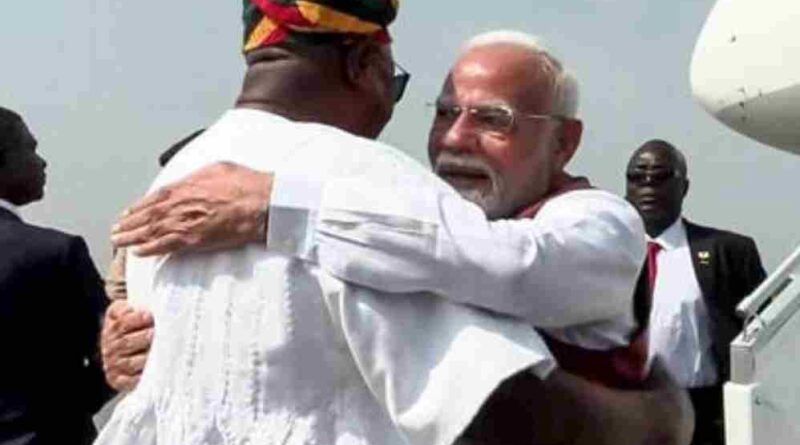PM Modi’s Landmark Visit to Ghana: A Bold Leap Toward Stronger South-South Partnerships
In a groundbreaking move that reflects India’s growing global footprint, Prime Minister Narendra Modi made history by becoming the first Indian Prime Minister to visit Ghana. The visit, which many are calling a milestone in South-South cooperation, goes beyond symbolism—marking a new era of diplomatic, economic, and strategic engagement between India and one of West Africa’s most influential democracies.
A Historic First
PM Modi’s arrival in Accra was met with warmth, ceremony, and a deep sense of shared history. Ghana, like India, emerged from colonial rule with dreams of self-reliance and global partnership. The Prime Minister’s visit was not only historic in terms of presence but also in terms of what it promised—substantial cooperation in sectors vital to both countries’ future development.
This wasn’t just a photo-op moment; it was a mission rooted in mutual growth, innovation, and opportunity.
Four Key Agreements, Endless Possibilities
During his visit, India and Ghana signed four major Memorandums of Understanding (MoUs) spanning critical sectors—defense, digital payments, mineral exploration, and education.
One of the most notable developments was India’s push to expand the Unified Payments Interface (UPI) system to Ghana. The potential here is transformative. For a country like Ghana, where mobile money is already a central part of daily life, integrating with India’s UPI architecture can supercharge digital financial inclusion and cross-border remittance efficiency. For India, it’s a chance to globalize its successful fintech model and reinforce digital diplomacy.
In the defense sector, a new MoU promises collaboration in training, logistics, and capacity building—reflecting India’s evolving role as a responsible power in global security. Ghana, which plays a significant peacekeeping role across Africa, stands to benefit from Indian expertise in strategic defense planning and technology.
Mining a Shared Future
Another major breakthrough came in the area of minerals. Ghana is rich in resources like gold, bauxite, and lithium—the latter being critical for the green energy transition. With India actively seeking stable sources for rare earths and critical minerals, this partnership could prove strategic for both economies. It also opens up avenues for sustainable mining practices, technology transfer, and equitable resource sharing.
Beyond Business: Cultural and Educational Ties
The visit wasn’t all about economics and geopolitics. Cultural diplomacy was a key thread in PM Modi’s engagements. From honoring the legacy of Mahatma Gandhi to acknowledging the influence of Ghana’s Kwame Nkrumah—both figures pivotal to anti-colonial movements—the visit underscored the deep philosophical and historical parallels between the two nations.
The signing of an MoU in education sets the stage for increased academic exchanges and scholarships, aiming to foster a generation of African and Indian students with a global outlook grounded in local understanding. India’s growing influence as a knowledge hub can open doors for thousands of Ghanaian youth seeking higher education and skill development.
India’s Africa Vision in Motion
This visit fits into India’s broader vision of expanding its engagement with the African continent—not as a patron, but as a partner. Unlike the extractive models of some global powers, India’s approach is increasingly framed around capacity-building, people-to-people links, and shared development goals.
Ghana’s strategic location, democratic stability, and entrepreneurial youth make it an ideal partner. For India, this also means greater access to West African markets, resources, and diplomatic goodwill—a smart move in a world where economic influence often outpaces military might.
A People-Centered Partnership
Perhaps the most humanizing element of this visit was the focus on building connections that matter to people’s lives—whether it’s making payments easier, improving defense cooperation, or boosting access to quality education. These are not distant policy ideas; they are solutions that touch daily realities.
The Indian diaspora in Ghana—small but vibrant—welcomed the Prime Minister with pride and enthusiasm. His interactions with the community were warm and personal, reinforcing the idea that diplomacy is not just statecraft but also storytelling—about shared hopes, struggles, and dreams.
Looking Ahead
PM Modi’s visit to Ghana signals a confident India looking outward, seeking partnerships that are not merely transactional, but transformational. The accords signed are stepping stones toward a deeper relationship—one built not on fleeting interests but on long-term collaboration.
As the world grapples with climate change, economic realignments, and digital disruptions, the India-Ghana relationship could well become a model for inclusive and future-ready South-South cooperation.
In the end, this was not just about inked agreements or handshakes. It was about planting seeds of trust, innovation, and mutual respect—seeds that, if nurtured, could redefine the contours of 21st-century global partnerships.
Disclaimer
The information and content shared on digitalgithub.com — including articles, blogs, news, guides, and other resources — is intended for general informational and educational purposes only. We do not guarantee the completeness, reliability, or suitability of any information. Always seek the guidance of a qualified professional before making decisions based on the information you read. Use this site at your own risk.

